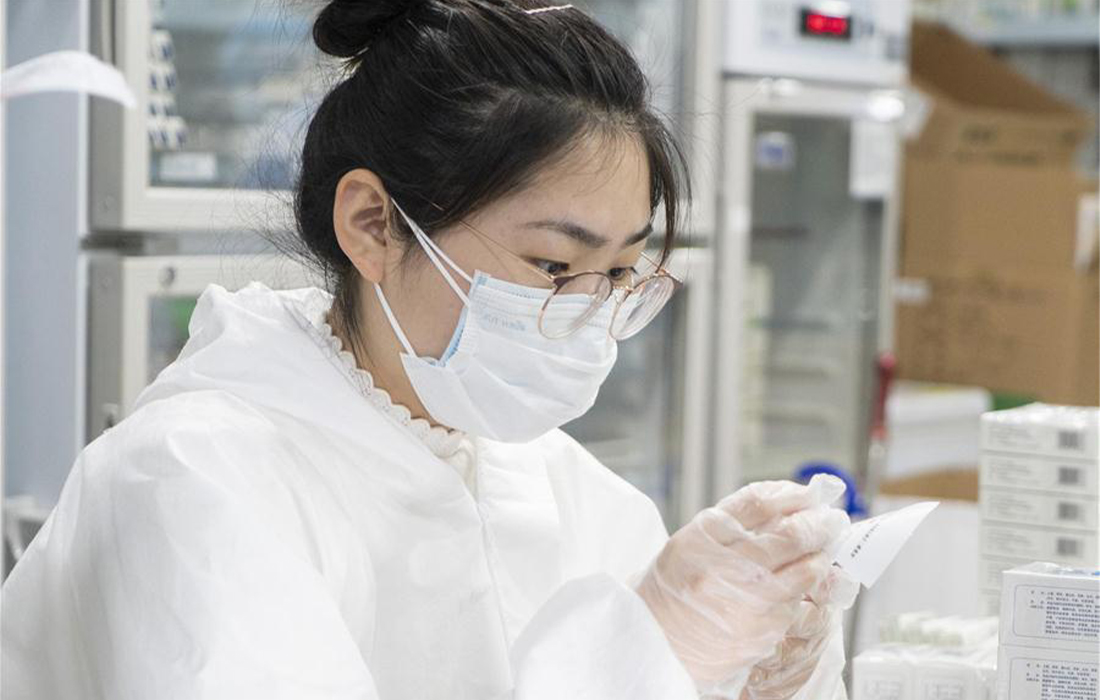HOME >> SOURCE
Chinese medical companies expand exports of Trump-backed anti-malarial drugs
By Qi Xijia Source:Global Times Published: 2020/3/26 23:18:40

A pharmacy staff member dispenses medicines at the chain store of Hankou pharmacy in Huangshi Road of Wuhan, central China's Hubei Province, Feb 27, 2020. Photo: Xinhua
Chinese medical companies are expanding their production and exports of anti-malarial drugs that have the potential to treat the coronavirus after India announced a ban on its exports of the drug.
Chinese companies are accelerating the production of two drugs - chloroquine and hydroxychloroquine - which US President Donald Trump has called "gamechangers" that could treat the coronavirus.
Su Shengqiang, president of Chongqing Kerui Pharmacy Co, told the Global Times on Thursday that they are accelerating the production of chloroquine with an output of 15 tons a month.
Most of its output is to be exported to markets including Africa, South America, the Middle East and South East Asia, now that the coronavirus has been contained in China.
Chloroquine phosphate is a medicine used to treat malaria and has a relatively small market in China as the disease has almost disappeared in the country, Tao Jianhong, a pharmaceutical market observer, told the Global Times on Thursday.
However, there was a rise in demand after it was included in the "Diagnosis and Treatment of Novel Coronavirus (Trial Version 6)" issued by the National Health and Medical Commission on February 19.
Since then, dozens of companies have shifted their production line to make the medicine.
"To meet domestic needs, we were one of the enterprises entrusted by the Ministry of Industry and Information Technology to start production on February 1. A total of 3.25 million tablets have been made since then," Su said.
After the domestic demand was met and the coronavirus was contained, the company started to export the medicine from mid-March.
However, they have not yet exported it to the US despite some business inquiries.
"Though we are expanding productivity, the output is still small because of the lack of component ingredients. With sufficient component ingredients we expect to double the productivity to 30 tons a month," he said.
Another reason is the lack of approval from the US Food and Drug Administration, he added.
"Based on what I know, no Chinese companies have exported chloroquine phosphate to the US market so far. It usually takes two to three years for a medicine to get FDA approval," he said, adding that his company has not yet filed an application to the FDA.
US regulators, however, have lifted import restrictions on an Indian pharmaceutical company to increase supplies of the drug, according to media reports.
Mumbai-based Ipca Laboratories Ltd. said on March 21 that the FDA has allowed it to supply tablets as well as raw materials for making chloroquine phosphate and hydroxychloroquine sulphate.
"The US is not likely to make the drug itself due to its relatively low economic value," Tao said. "Generally speaking, India is a little faster than China to get FDA certification."
While the FDA has approved the drug for treating malaria and other illnesses, the agency said in a statement on March 19 that "studies are underway to determine the efficacy in using chloroquine to treat COVID-19."
Posted in: INDUSTRIES